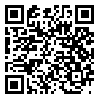Volume 14, Issue 1 (1-2025)
JCHR 2025, 14(1): 21-24 |
Back to browse issues page
Download citation:
BibTeX | RIS | EndNote | Medlars | ProCite | Reference Manager | RefWorks
Send citation to:



BibTeX | RIS | EndNote | Medlars | ProCite | Reference Manager | RefWorks
Send citation to:
Kalteh E A, Lotfi M H, Akhondi H, Izadi S. Conceptual Gap between Education and Literacy in Health Sciences Studies. JCHR 2025; 14 (1) :21-24
URL: http://jhr.ssu.ac.ir/article-1-1114-en.html
URL: http://jhr.ssu.ac.ir/article-1-1114-en.html
1- 1. Center for Healthcare Data Modeling, Department of Biostatistics and Epidemiology, School of Public Health, Shahid Sadoughi University of Medical Sciences, Yazd, Iran 2. Management and Social Development Research Center, Golestan University of Medical Sciences, Golestan, Iran
2- Center for Healthcare Data Modeling, Department of Biostatistics and Epidemiology, School of Public Health, Shahid Sadoughi University of Medical Sciences, Yazd, Iran
3- Center for Healthcare Data Modeling, Department of Biostatistics and Epidemiology, School of Public Health, Shahid Sadoughi University of Medical Sciences, Yazd, Iran ,shahin.izadi.65@gmail.com
2- Center for Healthcare Data Modeling, Department of Biostatistics and Epidemiology, School of Public Health, Shahid Sadoughi University of Medical Sciences, Yazd, Iran
3- Center for Healthcare Data Modeling, Department of Biostatistics and Epidemiology, School of Public Health, Shahid Sadoughi University of Medical Sciences, Yazd, Iran ,
Abstract: (1125 Views)
This article explores the distinction between education and literacy, emphasizing their close yet separate meanings. Education typically refers to formal schooling and academic qualifications, while literacy now includes a wider range of skills beyond basic reading and writing, such as digital, financial, and health literacy. Education is achieved through structured learning environments and results in certifications, whereas literacy involves the application of knowledge to effect significant changes in one’s life. Effective learning brings about stable changes in behavior, unlike temporary shifts due to external factors. The article argues that true literacy depends on various societal factors, including supportive families, well-equipped schools, and community resources. Despite this, many individuals receive degrees without attaining comprehensive literacy. In epidemiological research, addressing bias and confounding variables is crucial. Bias, such as misclassification bias, can skew results by misrepresenting data. Confounding occurs when an external variable influences both exposure and outcome, potentially distorting the observed relationships. Residual confounding may persist despite adjustments, highlighting the need for accurate indicators. The article questions the validity of using educational level as a proxy for literacy, suggesting it may not fully capture literacy’s complexity and introduce residual confounding.
Review: Editorial |
Subject:
Epidemiology
Received: 2024/12/1 | Accepted: 2025/01/27 | Published: 2025/02/24
Received: 2024/12/1 | Accepted: 2025/01/27 | Published: 2025/02/24
Send email to the article author
| Rights and permissions | |
 |
This work is licensed under a Creative Commons Attribution 4.0 International License. |







